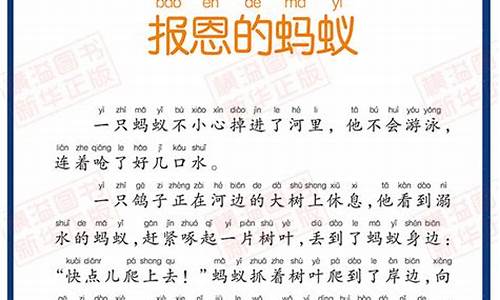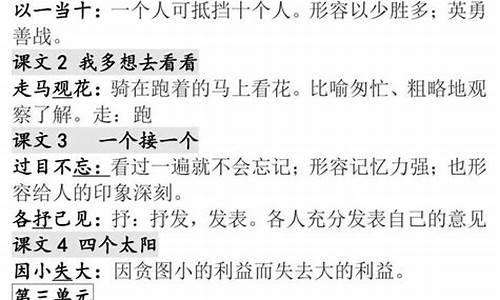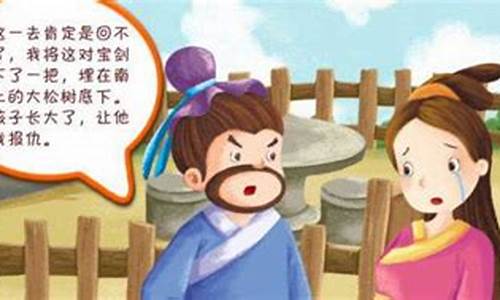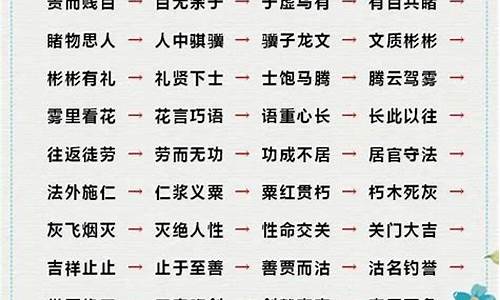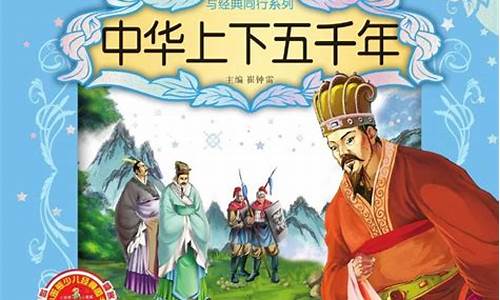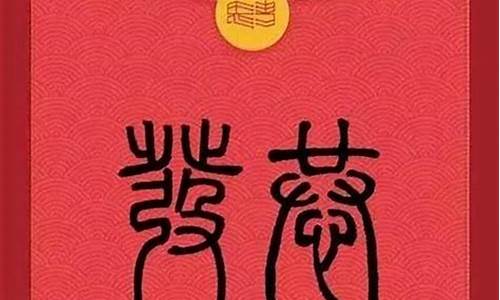您现在的位置是: 首页 > 成语歇后语 成语歇后语
中国成语故事英文版简短_中国成语故事英文版简短2分钟
ysladmin 2024-05-23 人已围观
简介中国成语故事英文版简短_中国成语故事英文版简短2分钟 在当今这个日新月异的时代,中国成语故事英文版简短也在不断发展变化。今天,我将和大家探讨关于中国成语故事英文版
在当今这个日新月异的时代,中国成语故事英文版简短也在不断发展变化。今天,我将和大家探讨关于中国成语故事英文版简短的今日更新,以期为大家带来新的启示。
1.?й????????Ӣ?İ???
2.小学一年级英语成语故事
3.成语故事 英文版
4.用英文翻译‘刻舟求剑’这个成语故事?
5.简单四字成语英文版
6.中国成语故事《九牛一毛》中英文版
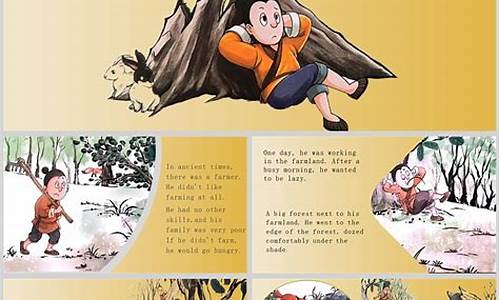
?й????????Ӣ?İ???
Peaches and Plums Do Not Have to Talk, Yet the World Beats a Path to Them--Natural Attraction(桃李不言,下自成蹊)
Duing the Western Han Dynasty(206 B.C.- A.D.24)Period, there was a very famous general whose name was Li Guang. He was very brave and skillful in battle, and had fought more than seventy battles with the Huns, an ancient nationality in China.Having made brilliant achievements in war, he was deeply loved and esteemed by the officers and men as well as the common people. However,he did not claim credit for himself and become arrogant,although he held a high post,commanding a big army,and had rendered outstanding service in defending the county. He was not only polite and amiable, but also shared weal and woe with the soldiers. He always had the troops under his commandat heart,and whenever gifts were bestowed to him by the imperial government,he distributed the gifts to his officers and men. When marching, he endured the torments of hunger and thirst as the soldiers did when food and water were in short supply. When fighting, he charged at the head of his men,and ,when he gave the order,every soldier advanced bravely to engage in fighting,not fearing death.
When the sad news of the heath of General Li Guang reached the militaty camp,the officers and men of the whole army wept bitterly.
西汉时候,有一位勇猛善战的将军,名叫李广,一生跟匈奴打过七十多次仗,战功卓著,深受官兵和百姓的爱戴。李广虽然身居高位,统领千军万马,而且是捍卫国度的功臣,但他一点也不居功自傲。他不仅待人和睦,还能和士兵同甘共苦。每次朝廷给他的赏赐,他首先想到的是他的部下,就把那些赏赐统统分给官兵们;行军打仗时,遇到粮食或水供给不上的情况,他自己也同士兵们一样忍饥挨饿;打起仗来,他身先士卒,英勇顽强,只要他一声令下,大家个个奋勇杀敌,不握牺牲。这是一位多么让人崇敬的大将军啊!
后来,当李广将军去世的噩耗传到军营时,全军将士无不痛哭流涕,连许多与大将军平时并不熟悉的百姓也纷纭悼念他。在人们心目中,李广将军就是他们崇拜的大好汉。
汉朝伟大的史学家司马迁在为李广立传时称赞道:“桃李不言,下自成蹊。”意思是说,桃李有着芳香的花朵,甜美的果实,虽然它们不会说话,但仍然会吸引人们到树下赏花尝果,以至树下都走出一条小路,李广将军就是以他的真诚和高贵的品质赢得了人们的崇敬。
小学一年级英语成语故事
塞翁失马Blessing or Bane
战国时期,靠近北部边城,住着一个老人,名叫塞翁。塞翁养了许多马,一天,他的马群中忽然有一匹走失了。邻居们听说这件事,跑来安慰,劝他不必太着急,年龄大了,多注意身体。塞翁见有人劝慰,笑了笑说:“丢了一匹马损失不大,没准会带来什么福气呢。”
邻居听了塞翁的话,心里觉得很好笑。马丢了,明明是件坏事,他却认为也许是好事,显然是自我安慰而已。过了几天,丢失的马不仅自动返回家,还带回一匹匈奴的骏马。 邻居听说了,对塞翁的预见非常佩服,向塞翁道贺说:“还是您有远见,马不仅没有丢,还带回一匹好马,真是福气呀。” 塞翁听了邻人的祝贺,反而一点高兴的样子都没有,忧虑地说:“白白得了一匹好马,不一定是什么福气,也许惹出什么麻烦来。” 邻居们以为他故作姿态纯属老年人的狡猾。心里明明高兴,有意不说出来。 塞翁有个独生子,非常喜欢骑马。他发现带回来的那匹马顾盼生姿,身长蹄大,嘶鸣嘹亮,膘悍神骏,一看就知道是匹好马。他每天都骑马出游,心中洋洋得意。 一天,他高兴得有些过火,打马飞奔,一个趔趄,从马背上跌下来,摔断了腿。邻居听说,纷纷来慰问。 塞翁说:“没什么,腿摔断了却保住性命,或许是福气呢。”邻居们觉得他又在胡言乱语。他们想不出,摔断腿会带来什么福气。 不久,匈奴兵大举入侵,青年人被应征入伍,塞翁的儿子因为摔断了腿,不能去当兵。入伍的青年都战死了,唯有塞翁的儿子保全了性命。Near China's northern borders lived a man well versed in the practices of Taoism. His horse, for no reason at all, got into the territory of the northern tribes. Everyone commiserated with him.
"Perhaps this will soon turn out to be a blessing," said his father.
After a few months, his animal came back, leading a fine horse from the north. Everyone congratulated him.
"Perhaps this will soon turn out to be a cause of misfortune," said his father.
Since he was well-off and kept good horses his son became fond of riding and eventually broke his thigh bone falling from a horse. Everyone commiserated with him.
"Perhaps this will soon turn out to be a blessing," said his father.
One year later, the northern tribes started a big invasion of the border regions. All able-bodied young men took up arms and fought against the invaders, and as a result, around the border nine out of ten men died. This man's son did not join in the fighting because he was crippled and so both the boy and his father survived.
成语故事 英文版
⑴ 小学1--6年级所有的成语故事开卷有益 · 博而不精 · 百发百中 · 捕风捉影
· 必恭必敬 · 百感交集 · 兵贵神速 · 杯弓蛇影
· 不寒而栗 · 不合时宜 · 不自量力 · 不拘一格
· 不可多得 · 不堪回首 · 不可救药 · 别开生面
· 不可同日而语 · 不伦不类 · 伯乐相马 · 班门弄斧
· 白面书生 · 八面威风 · 不名一钱 · 拔苗助长
· 不屈不挠 · 不求甚解 · 髀肉复生 · 病入膏肓
· 不入虎穴,不得虎子 · 拔山举鼎 · 博士买驴 · 冰山难靠
· 背水一战 · 半途而废 · 不贪为宝 · 白头如新
· 百闻不如一见 · 不为五斗米折腰 · 抱薪救火 · 标新立异
· 不学无术 · 不入虎穴,不得虎子 · 不远千里 · 不因人热
· 别有天地 · 不遗余力 · 百折不挠 · 百丈竿头
· 不自量力 · 不知所云 · 宾至如归 · 拔帜易帜
· 残杯冷炙 · 寸草春晖 · 草船借箭 · 乘风破浪
· 才高八斗 · 城狐社鼠 · 沧海桑田 · 草菅人命
· 草木皆兵 · 程门立雪 · 长驱直入 · 车水马龙
· 乘兴而来 · 沉鱼落雁 · 乘人之危 · 车载斗量
· 大笔如椽 · 打草惊蛇 · 雕虫小技 · 大材小用
· 多多益善 · 大腹便便 · 大公无私 · 当局者迷
· 大逆不道 · 大器晚成 · 当务之急 · 开诚布公
· 不得要领 · 抛砖引玉 · 二桃杀三士 · 尔虞我诈
· 罚不当罪 · 奋不顾身 · 分崩离析 · 风吹草动
· 覆巢无完卵 · 分道扬镳 · 奉公守法 · 负荆请罪
· 发奸擿伏 · 返老还童 · 发蒙振落 · 风声鹤唳
· 覆水难收 · 赴汤蹈火 · 分庭抗礼 · 防微杜渐
· 负隅顽抗 · 负重致远 · 管鲍之交 · 各得其所
· 感恩图报 · 过河拆桥 · 刮目相看 · 瓜田李下
· 高枕无忧 · 各自为政 · 华而不实 · 好好先生
· 狐假虎威 · 汗流浃背 · 后来居上 · 合浦珠还
· 后起之秀 · 后生可畏 · 火树银花 · 坚壁清野
· 间不容发 · 井底之蛙 · 鸡口牛后 · 江郎才尽
· 见猎心喜 · 鸡鸣狗盗 · 九牛一毛 · 胶漆相投
· 举一反三 · 开诚布公 · 空洞无物 · 沆瀣—气
· 克己奉公 · 开卷有益 · 侃侃而谈 · 口蜜腹剑
· 开门揖盗 · 空前绝后 · 克勤克俭 · 旷日持久
· 困兽犹斗 · 开天辟地 · 口若悬河 · 空中楼阁
· 刻舟求剑 · 脍炙人口 · 狼狈不堪 · 力不从心
· 两败俱伤 · 乐不思蜀 · 老当益壮 · 劳而无功
· 论功行赏 · 老马识途 · 老牛舐犊 · 老妪能解
· 老生常谈 · 梁上君子 · 蓝田生玉 · 滥竽充数
· 狼子野心 · 芒刺在背 · 买椟还珠 · 马革裹尸
· 门可罗雀 · 名落孙山 · 孟母三迁 · 马首是瞻
· 毛遂自荐 · 门庭若市 · 木人石心 · 牛鼎烹鸡
· 怒发冲冠 · 鸟尽弓藏 · 南柯一梦 · 弄巧成拙
· 穷兵黩武 · 宁为玉碎,不为瓦全 · 难兄难弟 · 南辕北辙
· 天真料漫 · 千变万化 · 七步之才 · 庆父不死鲁难未已
· 曲高和寡 · 曲尽其妙 · 千金市骨 · 千钧一发
· 千里鹅毛 · 黔驴技穷 · 千虑一得 · 巧取豪夺
· 七擒七纵 · 杞人忧天 · 曲突徙薪 · 千万买邻
· 犬牙交错 · 千人所指 · 千载难逢 · 气壮山河
· 日不暇给 · 人非圣贤,孰能无过 · 人给家足 · 如火如荼
· 人杰地灵 · 日暮途穷 · 入木三分 · 人琴俱亡
· 人弃我取 · 忍辱负重 · 任人为贤 · 人人自危
· 如释重负 · 入吾彀中 · 人心如面 · 如鱼得水
· 人言可畏 · 孺子可教 · 手不释卷 · 士别三日
· 死不旋踵 · 师出无名 · 三寸之舌 · 水滴石穿
· 死而不朽 · 伤风败俗 · 三顾茅庐 · 双管齐下
· 死灰复燃 · 十行俱下 · 四海之内皆兄弟 · 尸居余气
· 司空见惯 · 水落石出 · 三令五申 · 四面楚歌
· 三迁之教 · 三人成虎 · 杀身成仁 · 水深火热
· 识时务者为俊杰 · 三生有幸 · 尸位素餐 · 塞翁失马
· 上下其手 · 上行下效 · 随月读书 · 守株待兔
· 三折其肱 · 土崩瓦解 · 同仇敌忾 · 同仇敌忾
· 太公钓鱼愿者上钩 · 同甘共苦 · 同工异曲 · 天经地义
· 天下无双 · 天涯海角 · 天衣无缝 · 一夔已足
· 穷兵黩武 · 庄周梦蝶 · 曾参杀人 · 以强凌弱
· 完壁归赵 · 韦编三绝 · 无出其右 · 为虎作伥
· 刎颈之交 · 无可奈何 · 望梅止渴 · 五日京兆
· 危如累卵 · 万死不辞 · 万事俱备只欠东风 · 五色无主
· 亡羊补牢 · 未雨绸缪 · 妄自尊大 · 下笔成章
· 下车泣罪 · 先发制人 · 兴高采烈 · 心旷神怡
· 朽木不雕 · 休戚相关 · 先声夺人 · 小巫见大巫
· 小时了了 · 小心翼翼 · 一败涂地 · 有备无患
· 一不做、二不休 · 一傅众咻 · 一傅众咻 · 以强凌弱
· 饮醇自醉 · 一代楷模 · 一发千钧 · 约法三章
· 以古非今 · 叶公好龙 · 以管窥天 · 言过其实
· 一国三公 · 以规为滇 · 愚公移山 · 一鼓作气
· 一挥而就 · 与虎谋皮 · 异军突起 · 有脚阳春
· 以卵击石 · 以邻为壑 · 夜郎自大 · 一毛不拔
· 一鸣惊人 · 一木难支 · 以貌取人 · 羽毛未丰
· 有名无实 · 一诺千金 · 一暴十寒 · 一窍不通
· 一钱不值 · 予取予求 · 一丘之貉 · 一日千里
· 一日三秋 · 一丝不拘 · 一身是胆 · 以身试法
· 一事无成 · 一网打尽 · 义无反顾 · 一问三不知
· 一误再误 · 月下老人 · 忧心如焚 · 一衣带水
· 一意孤行 · 一叶障目 · 有志竟成 · 一字千金
· 有恃无恐 · 饮鸩止渴 · 自惭形秽 · 专横跋扈
守株待兔:守是 守候、等候 的意思 , “株”是指 露在地面上的树木的根和茎。这个成语的意思是: 守候在树旁,等着捡撞死的兔子。比喻不主动地努力,存着侥幸的心理,希望得到意外的收获。
邯郸学步:故事出自《庄子·秋水》。成语“邯郸学步”,比喻生搬硬套,机械地模仿别人,不但学不到别人的长处,反而会把自己的优点和本领也丢掉。
· 邯郸学步:比喻生搬硬套,机械地模仿别人,不但学不到别人的长处,反而会把自己的优点和本领也丢掉。
· 狐假虎威:狐狸假借老虎的威势。比喻依仗别人的势力欺压人。
· 百发百中: 形容射箭或打枪准确,每次都命中目标。也比喻做事有充分把握。
· 捕风捉影:风和影子都是抓不着的。比喻说话做事丝毫没有事实根据。
· 杞人忧天:杞国有个人怕天塌下来。比喻不必要的或缺乏根据的忧虑和担心。
· 井底之蛙:井底的蛙只能看到井口那么大的一块天。比喻见识狭窄的人。
· 望梅止渴:原意是梅子酸,人想吃梅子就会流涎,因而止渴。后比喻愿望无法实现,用空想安慰自己。
· 杯弓蛇影:将映在酒杯里的弓影误认为蛇。比喻因疑神疑鬼而引起恐惧。
· 郑人买履:用来讽刺只信教条,不顾实际的人。
· 不合时宜:不适合时代形势的需要。也指不合世俗习尚。
· 守株待兔:原比喻希图不经过努力而得到成功的侥幸心理。现也比喻死守狭隘经验,不知变通。
· 愚公移山:比喻坚持不懈地改造自然和坚定不移地进行斗争。
· 曲突徙薪:把烟囱改建成弯的,把灶旁的柴草搬走。比喻事先采取措施,才能防止灾祸。
· 抛砖引玉:抛出砖去,引回玉来。比喻用自己不成熟的意见或作品引出别人更好的意见或好作品。
· 自相矛盾:比喻自己说话做事前后抵触。
· 滥竽充数:比喻无本领的冒充有本领,次货冒充好货。
· 刻舟求剑:比喻不懂事物已发展变化而仍静止地看问题。
· 叶公好龙:比喻口头上说爱好某事物,实际上并不真爱好。
· 亡羊补牢:羊逃跑了再去修补羊圈,还不算晚。比喻出了问题以后想办法补救,可以防止继续受损失。
· 画蛇添足:画蛇时给蛇添上脚。比喻做了多余的事,非但无益,反而不合适。
· 掩耳盗铃:偷铃铛怕别人听见而捂住自己的耳朵。比喻自己欺骗己,明明掩盖不住的事情偏要想法子掩盖。
· 买椟还珠:买下木匣,退还了珍珠。比喻没有眼力,取舍不当
⑵ 适合一年级学生参赛的成语故事有哪些
这些成语故事很多,比如说一些寓言故事还有历史故事。这些都可以的选择一个喜欢的就行。
⑶ 小学一年级英汉双译成语故事:滴水穿石
滴水穿石
水不断下滴,可以闹穿石头。 比喻只要有恒心,不断努力,事情一定成功。专
[拼音]
dī shuǐ chuān shí
[出处属]
宋·罗大经《鹤林玉露·一钱斩吏》:“乖崖援笔判曰:‘一日一钱;千日千钱;绳锯木断;水滴石穿。’”
[例句]
同学们在日常学习中,应该有滴水穿石的精神。
[近义]
水滴石穿 锲而不舍 绳锯木断 孜孜不倦 ...
[反义]
半途而废 浅尝辄止
⑷ 小学一年级英汉双译成语故事:笨鸟先飞
成语来源
The early bird catches the worm
笨鸟先飞
A bird hatches six baby birds.The Sixth is very weak and *** all; his sisters and brothers usually bully him.The other birds usually rob food from his mouth, and the Sixth has to suffer from hunger.
树上一只鸟妈妈孵出了六只鸟宝宝,小六回又瘦又小,哥哥姐姐答们都欺负它;经常从它嘴里抢虫子,小六只得饿着肚子。
Sisters and Brothers call him “clumsy bird.”
哥哥姐姐们都叫他“小笨鸟”。
He determines to exercise more to be healthier, in order to not be laughed by his sisters and brothers.
⑸ 一年级成语故事有哪些
一、坐井观天
在一口废井里,住着一只青蛙。一天,青蛙在井边碰见一只从东海来的海龟。 青蛙自豪地对海鬼夸口说:“你看,我住在这里多么惬意呀!我要高兴,就在井边跳跃游玩,累了就到井壁石洞里休息。
有时把身子舒服地泡在水里,有时愉快地在稀泥中散散步。你看旁边的那些小虫、螃蟹和蝌蚪,它们谁能比得上我呢!我独自占据这口废井,多么自由自在!
先生为什么不经常到井中观赏游玩呢?” 海鬼听了青蛙的一番高谈阔论,就想进入井中看看。可是,它的左脚还没有完全伸进去,右脚就被井栏绊住了。
它只好后退几步,把它看到的大海的情景告诉青蛙:“你见过大海吗?海的广大,岂止千里;海的深度,何止千丈。
古时候,十年里就有九年闹水灾,海水并不因此增多;八年里就有七年闹旱灾,海水却不因此而减少。大海不受旱涝影响,住在广阔无垠的大海里才是真正的快乐。
二、掩耳盗铃
春秋末期,晋国有个叫范吉射的人,家门口挂了一口大钟。在我国古代,钟和铃都是乐器。 一天,有个人到范吉射家里,见到门口的钟,想偷偷地把它背走。但是,钟太笨重了,他根本无法把它背走。后来,终于想出了一个办法:把钟敲碎了,分批拿回去。
于是,他找了一个铁锤,用力去敲钟。“当——”第一下敲上去,钟就发出洪亮悠长的响声;再敲下去,钟发出同样的响声。他想:“钟声一响,人家就知道我在这里敲钟。
这样,钟就要被别人夺走,我也要被人抓住。”于是,他捂住自己的耳朵,这样钟声再响也听不见了,他想既然我离得这么近也听不见,其他人当然更听不见,就可以安全地将钟偷走了。
其实他非常愚蠢可笑:虽然他捂住了耳朵听不见钟声,但别人的耳朵没有被捂住,当然还会听见钟声。 后来,人们就把这个故事概括成“掩耳盗铃”这一成语,来比喻那些自以为是、自欺欺人的人。
三、刻舟求剑
有一个楚国人出门远行。他在乘船过江的时候,一不小心,把随身带着的剑落到江中的急流里去了。船上的人都大叫:“剑掉进水里了! 这个楚国人马上用一把小刀在船舷上刻了个记号,然后回头对大家说:“这是我的剑掉下去的地方。”
众人疑惑不解地望着那个刀刻的印记。有人催促他说:“快下水去找剑呀!” 楚国人说:“慌什么,我有记号呢。”
船继续前行,又有人催他说:“再不下去找剑,这船越走越远,当心找不回来了。” 楚国人依旧自信地说:“不用急,不用急,记号刻在那儿呢。”
直至船行到岸边停下后,这个楚国人才顺着他刻有记号的地方下水去找剑。可是,他怎么能找得到呢。船上刻的那个记号是表示这个楚国人的剑落水瞬间在江水中所处的位置。
掉进江里的剑是不会随着船行走的,而船和船舷上的记号却在不停地前进。等到船行至岸边,船舷上的记号与水中剑的位置早已风马牛不相及了。这个楚国人用上述办法去找他的剑,不是太糊涂了吗?
他在岸边船下的水中,白费了好大一阵工夫,结果毫无所获,还招来了众人的讥笑。 这则故事告诉我们,用静止的眼光去看待不断发展变化的事物,必然要犯脱离实际的主观唯心主义错误。
四、守株待兔
春秋战国时期,宋国有个农夫种着几亩地,他的地头上有一棵大树。一天,他在地里干活,忽然看见一只兔子箭一般地飞奔过来,猛的撞在那棵大树上,一下子把脖子折断了,蹬蹬腿就死了。
这个农夫飞快的跑过去,把兔子捡起来,高兴地说:“这真是一点劲没费,白捡了个大便宜,回去可以美美地吃上一顿了。”
他拎着兔子一边往家走,一边得意地想:“我的运气真好,没准明天还会有兔子跑来,我可不能放过这样的便宜。”
第二天,他到地里,也不干活,只守着那棵大树,等着兔子撞过来。结果,等了一天什么也没等到。
他却不甘心,从此,天天坐在那棵大树下等着兔子来撞死。他等呀等呀,直等到地里的野草长得比庄稼都高了,连个兔子影也没有再见到。
五、亡羊补牢
从前,有个人养了一圈羊。一天早上他准备出去放羊,发现少了一只。原来羊圈破了个窟窿。夜间狼从窟窿里钻进来,把羊叼走了。
邻居劝告他说:"赶快把羊圈修一修,堵上那个窟窿吧!"他说:"羊已经丢了,还修羊圈干什么呢?"没有接受邻居的劝告。
第二天早上,他准备出去放羊,到羊圈里一看,发现又少了一只羊。原来狼又从窟窿里钻进来,把羊叼走了。
他很后悔,不该不接受邻居的劝告,就赶快堵上那个窟窿,把羊圈修补得结结实实。从此,他的羊再也没有被狼叼走的了。
说明:羊丢了,把羊圈修补起来,剩下的羊就不会再丢。犯了错误,立即改正,就能减少错误。遭到失误,及时采取补救措施,则可以避免继续出现的损失。
⑹ 小学一年级英汉双译成语故事:对佟33小学
成语: 狐假虎威
拼音: hú jiǎ hǔ wēi
解释: 假:借。狐狸假借老虎的威势。比喻依仗别人的势力欺压人。
出处: 《战国策·楚策一》:“虎求百兽而食之,得狐。……虎以为然,故遂与之行。兽见之皆走,虎不知兽畏己而走也,以为畏狐也。”
举例造句: 果然府中来借,怎好不借?只怕被别人狐假虎威的诓的去,这个却保不得他。 明·凌濛初《二刻拍案惊奇》卷二十
拼音代码: hjhw
近义词:仗势欺人、狗仗人势
反义词:独步天下、独擅胜场
歇后语: 狐狸跟着老虎走
灯谜: 风顺腋臭浓
用法: 作谓语、定语、宾语;指借机欺压别人
英文:bully people by flaunting one's powerful connections
故事: 很久以前,森林里有只老虎看到一只狐狸就想吃掉它,狐狸大叫:“我是玉帝派来的百兽之王,你如同一起走一走,看看森林里的动物是不是很害怕我。”老虎想也没想就随同前往,果然小动物见了就跑
狐假虎威
[词典] (比喻借别人的威势欺压人)the fox assuming the majesty of the tiger -- borrowing power to do evil;(like)a donkey [an ass] in a lion's hide;a fox masquerading as a tiger;assume someone else's authority as one's own;
[例句]“狐假虎威”这个成语的意思是借着别人的势力去欺压人或吓唬人。
This idiom means relying on another's power to bully or frightenothers.
⑺ 小学一年级英汉双译成语故事:守株待兔
成语故事:宋国有个农夫正在田里翻土。突然,他看见有一只野兔从旁边的草丛里慌慌张张地窜出来,一头撞在田边的树墩子上,便倒在那儿一动也不动了。农民走过去一看:兔子死了。因为它奔跑的速度太快,把脖子都撞折(shé)了。农民高兴极了,他一点力气没花,就白捡了一只又肥又大的野兔。他心想;:要是天天都能捡到野兔,日子就好过了。从此,他再也不肯出力气种地了。每天,他把锄头放在身边,就躺在树墩子跟前,等待着第二只、第三只野兔自己撞到这树墩子上来。世上哪有那么多便宜事啊。农民当然没有再捡到撞死的野兔,而他的田地却荒芜了。因为没能再次得到兔子,农民自己沦为了宋国的笑柄。
英文翻译
During the period of Warring States, many people lived on farming. One day, a farmer found that a hare bumped against a stump and died because it ran so quickly that it did not see the stump. That a hare bumped into the sump was less likely to happen again. However, the farm chose to sit near the stump, waiting for another hare, instead of farming to make a living. Eventually, the farmer starved to death.
Waiting for him
用英文翻译‘刻舟求剑’这个成语故事?
掩耳盗铃Plugging One's Ears While Stealing a Bell
春秋时侯,晋国贵族智伯灭掉了范氏。有人趁机跑到范氏家里想偷点东西,看见院子里吊着一口大钟。钟是用上等青铜铸成的,造型和图案都很精美。小偷心里高兴极了,想把这口精美的大钟背回自已家去。可是钟又大又重,怎么也挪不动。他想来想去,只有一个办法,那就是把钟敲碎,然后再分别搬回家。
小偷找来一把大大锤,拼命朝钟砸去,咣的一声巨响,把他吓了一大跳。小偷着慌,心想这下糟了,这种声不就等于是告诉人们我正在这里偷钟吗?他心里一急,身子一下子扑到了钟上,张开双臂想捂住钟声,可钟声又怎么捂得住呢!钟声依然悠悠地传向远方。
他越听越害怕,不同自由地抽回双手,使劲捂住自已的耳朵。“咦,钟声变小了,听不见了!”小偷高兴起来,“妙极了!把耳朵捂住不住就听不进钟声了吗!”他立刻找来两个布团,把耳朵塞住,心想,这下谁也听不见钟声了。于是就放手砸起钟来,一下一下,钟声响亮地传到很远的地方。人们听到钟声蜂拥而至把小偷捉住了。
故事出自《吕氏春秋?6?1自知》“掩耳盗钟”被说成“掩耳盗铃”,比喻愚蠢自欺的掩饰行为。
Plugging One's Ears While Stealing a Bell
During the Spring and Autumn period,Zhi Bo of the State of Jin destroyed Fan's family.Taking advantage of this occasion,a man went to Fan's house and tried to steal something.As soon as the man entered the gate,he saw that there hung a big bell in the courtyard.The bell was cast in high-quality bronza,and was beautiful in design and shape.The theif was very glad,and decided to carry this beautiful bell back home.But no matter how hard he tried,he could not move the bell,because the bell was both big and heavy.He thought and thought again,and believed there was only one way to solve the problem.He had to break the bell to pieces before he was able to carry them back to his home separately.
The thief found a big iron hammer,with which he struck the bell with all his might.The striking produced an enormous crashing sound,which might.The striking produced an enormous crashing sound,which made the thief terribly frightened.The thief got flurried,thinking that it was too bad to have produced the crashiing sound which would himself on the bell,trying to muffle the crashing sound with his arms.But how could the crashing sound of the bell be muffled?The crashing sound still kept drifting melodiously to distant places.The more he listened to the sound,the more frightened hw became.He xubconsciously shrank back,and covered his ears hard with his hands."Hey,the sound becomes fainter,inaudible,"the thief became cheerful at once," wonderful!The sound of the bell can not be heard when the ears are covered."He immediately got some odd bits of cloth,made two rolls with them,and had his ears plugged with the two cloth rolls.He thought that in this way nobody could hear the sound of the bell.Feeling relieved,he began striking the bell,one blow after another.The resounding sound of the bell was heard at distant places,and finally people caught the thief by gracing the sound.
This story comes from"Knowing Yourself" in The Annals by Buwei,written just before the Qin Dynasty(221-207 B.C.)was founded.Allegedly,when Li Yuan,Emperor Gao Zu of the Tang Dynasty(618-907),read this story,he felt it simply ridiculous and said,"This is what is called plugging one's ears while stealing a bell."
Later,people have used the set phrase "plugging one's ears while stealing a bell" to refer to the ignorance and foolishness of the person who deceives himself as well as others.
简单四字成语英文版
出自:《吕氏春秋·察今》》:“楚人有涉江者,其剑自舟中坠于水,遽契其舟曰:‘是吾剑之所从坠。’舟止,从其所契者入水求之。舟已行矣,而剑不行,求剑若此,不亦惑乎?”Long, long ago, in Chunqu Dynasty of ancient China, a man from Chu state dropped his beautiful well-set sword into the water because of the shake from the boat while he was in the middle of the river ."Oh, God." He cried in dear pity. "What can I do ?" On hearing that, the boatman replied calmly "It doesn't matter. I'm coming to dive for it." But the man from Chu hesitated for a while and said "We can't do that because the water is rapid and deep. But I have a marvelous idea." With these words, he took out his knife and made a mark on one side of the boat where his sword was dropped. "Well, everything is done! " When the boat stopped at the opposite bank, the man undressed himself immediately and dove into the water for his sword from the very place where he had made the mark. Of course, he got nothing. Finally he appeared in the water and murmured: "What's happening? why can't I find my sword from the water just under the mark? " Laughter burst from the passengers. Well, let's end the story with the conclusion: Man should not stick stubbornly to his own opinion, instead he should make changes according to specific conditions. 有一次,一个楚国人坐船过江。船到江心时一个不小心,他失手把心爱的宝剑掉到了水里。好心的船夫愿意帮他捞剑,可是这个楚国人不慌不忙,把掉剑的位置刻在船身上,说:“不用了,等船靠岸后再说吧!”。船靠岸以后,他才请船夫从他刻了记号的船边下水,替他打捞宝剑。但是船一直在走,而剑掉到了水中就不会再移动。就算船夫潜水的本领再高,又怎么可能找到根本不在船下的剑呢?
中国成语故事《九牛一毛》中英文版
1. 简洁的成语故事(英文版)
郑人买履(A man from the State of Zheng bought shoes)Once upon a time , a man in the State of Zheng went to the market to buy a pair of shoes. Before he left for the market, he had measured his feet with a piece me straw. However , he couldn't find the measurement because he had left it at home . So he had to say sorry to the owner that he had to go home for it, which confused the owner why he didn't try the shoes on with his own feet . The man *** iled to the owner , " I would rather believe in the measuremens than my own feet."。
2. 英语的四字成语keep somebody at arm's length, 形影不离
be on one's back, 卧病在床
make somebody's blood boil, 热血沸腾
Keep one's shirt on, 忍辱负重
Shout something from the rooftops , 登高而呼
Be all ears, 洗耳恭听
out of the blue, 猝不及防
at sixes and sevens, 乱七八糟
A bolt from the blue 晴天霹雳
love you love your dog 爱屋及乌
a bad apple, 金玉其外,败絮其中
It rains dogs and cats.倾盆大雨
Fish in trouble water.混水摸鱼
Teach fish to swim.班门弄斧
Beat the dog before the lion.杀鸡敬猴
3. 英语的四字词语繁荣昌盛thriving and prosperous爱不释手fondle admiringly爱财如命skin a flea for its hide爱屋及乌love me, love my dog. He that loves the tree loves the branch恨屋及乌:He who hates Peter har his dog.)安居乐业live and work in peace and contentment白手起家build up from nothing / build up from scratch /start from scratch百里挑一one in a hundred / the cream of the crop百折不挠be indomitable半途而废give up halfway leave sth. Unfinished包罗万象all-embracing all-inclusive饱经风霜weather-beaten卑躬屈膝bow and scrape cringe悲欢离合vicissitudes of life背道而驰run counter to run in the opposite direction本末倒置put the cart before the horse笨鸟先飞the slow need to start early必由之路the only way闭关自守close the country to international intercourse变本加厉be further intensified变化无常chop and change fantasticality 变化无常chop and change fantasticality别开生面having sth. New别有用心have ulterior motives彬彬有礼refined and courteous urbane兵不厌诈in war nothing is too deceitful博古通今erudite and informed不败之地incincible position不耻下问feel not ashamed to learn from one's subordinates不可救药be past praying for beyond redemption不劳而获reap where one has not sown不屈不挠fortitude indefatigability perseverance persevere tenacity不速之客crasher uninvited guest不同凡响outstanding不言而喻speak for itself tell its own story tell its own tale went without saying不遗余力spare no effort spare no pains不以为然not approve object to不义之财filthy lucre filthy pelf the mammon of unrighteousness不亦乐乎extremely不远千里go to the trouble of travelling a long distance不约而同happen to coincide不择手段by any kind of means by hook or crook play hard by fair means or foul不知所措be at a loss be all adrift lose one's head out of one's wits才疏学浅have little talent and learning惨绝人寰extremely cruel沧海桑田time brings a great change to the worlds沧海一粟/九牛一毛a drop in the bucket草木皆兵a state of extreme nervousness层出不穷emerge in endlessly。
4. 英语的四字成语优质解答keep somebody at arm's length,形影不离 be on one's back,卧病在床 make somebody's blood boil,热血沸腾 Keep one's shirt on,忍辱负重 Shout something from the rooftops ,登高而呼 Be all ears,洗耳恭听 out of the blue,猝不及防 at sixes and sevens,乱七八糟 A bolt from the blue 晴天霹雳love you love your dog 爱屋及乌 a bad apple,金玉其外,败絮其中It rains dogs and cats.倾盆大雨 Fish in trouble water.混水摸鱼 Teach fish to swim.班门弄斧 Beat the dog before the lion.杀鸡敬猴。
少儿英语成语故事:毛遂自荐
中国成语故事《九牛一毛》中英文版
Li Ling was a great general during the time of emperor Han Wu-di (hàn wǔ dì汉武帝). He was a very good fighter, and he won every battle.
One time, however, Li Ling's troops were so hopelessly outnumbered by the Huns that although they fought bravely, the whole army was soon taken captive.
Li Ling shamefully surrendered for the moment, planning to wait for an opportunity to strike back.
But when news of the surrender reached the capital, the emperor's jealous ministers began to degrade Li Ling in front of the emperor.
What he heard made the emperor so angry that he had Li Ling's wife and mother put to death.
Ze-ma Chian, who had always respected Li Ling, believed that he wouldn't surrender without a reason, and urged the emperor not to believe rumors.
Sz-ma Chian then wrote a long letter to a friend, saying, "I am now in the middle of writing a history book. If I die, it will be as if one ox in a group on nine were to lose a single hair. I am willing to withstand punishment in order to complete this book." Sz-ma Chian finally did finish his book - the very famous Shr-Ji.
This time, the emperor grew angry at Sz-ma Chian, and locking him up, punished him severely.
用英语简单写一个中国成语故事
volunteer to do sth/recommend oneself毛遂自荐
In the Warring States Period, the State of Qin besieged the capital of the State of Zhao.战国时代,秦国军队攻打赵国的都城。
Duke Pingyuan of Zhao planned to ask the ruler of the State of Chu personally for assistance.He wanted to select a capable man to go with him. 赵国的平原君打算亲自到楚国去请救兵,想挑选一个精明能干的人一同前去。
A man called Mao Sui volunteered. 有一个名叫毛遂的人,自告奋勇愿意同去。
When the negotiactions between the two states were stalled because the ruler of Chu hesitated to send troops, Mao Sui approached him, brandishing a sword. At that, the ruler of Chu agreed to help Zhao, against Qin.平原君到楚国后,与楚王谈了半天,没有一点结果。毛遂怒气冲冲地拿着宝剑,逼近楚王,终于迫使楚王答应出兵,与赵国联合共同抵抗秦国。
This idiom means to recommend oneself.“毛遂自荐”这个成语用来比喻自己推荐自己,不必别人介绍。
文化链接
英文中“毛遂自荐”可以说成“volunteer to do sth”,“volunteer”既可以作名词,也可以作动词,作名词时的意思是“志愿者”,作动词就可以解释为“志愿去做什么事”,就是“毛遂自荐”啦~
我们来一起看几个例句吧~
Our company volunteered to support and help the victims. 我们的公司毛遂自荐来帮助受灾灾民。
You can volunteer to work one or multiple shifts。你可以毛遂自荐做单班制,也可以选择多班制。
英语成语故事-井底之蛙
The Frog in the Shallow Well (Jing Di Zhi Wa)
Have you not heard of the frog that lived in a shallow well? It said to a turtle that lived in the East Sea, "I am so happy! When I go out, I jump about on the railing beside the mouth of the well. When I come home, I rest in the holes on the broken wall of the well. If I jump into the water, it comes up to my armpits and holds up my cheeks. If I walk in the mud, it covers up my feet. I look around at the wriggly worms, crabs and tadpoles, and none of them can compare with me. Moreover, I am lord of this trough of water and I stand up tall in this shallow well. My happiness is full. My dear sir, why don't you come often and look around my place?"
Before the turtle from the East Sea could get its left foot in the well, its right knee got stuck. It hesitated and retreated. The turtle told the frog about the East Sea.
"Even a distance of a thousand li cannot give you an idea of the sea's width; even a height of a thousand ren cannot give you an idea of its depth. In the time of King Yu of the Xia dynasty, there were floods nine years out of ten, but the waters in the sea did not increase. ln the time of King Tang of the Shang dynasty there were droughts seven years out of eight, but the waters in the sea did not decrease. The sea does not change along with the passage of time and its level does not rise or fall according to the amount of rain that falls. The greatest happiness is to live in the East Sea."
After listening to these words, the frog of the shallow well was shocked into realization of his own insignificance and became very ill at ease.
=============================
英语故事:惊弓之鸟
A Bird Startled by the Mere Twang of a Bow-String
This set phrase figuratively denotes those who have suffered disasters and so have a lingering fear when anything happen.
During the War Period ,in the Wèi State there lived a famous archer named Gēng léi.
One day,Gēng léi and the King of Wei standing on a high terrace saw some birds flying past.
At this Gēng léi said to the King:"I'll shoot a flying bird down for YourMajesty by drawing a bow with no arrow."
The King asked,"Is it possible that one's archery can attain such a level?"
A little later,a wild goose was flying from the east.
Gēng léi just drew his bow but didn't shoot an arrow.
As expected,the wild goose fell to the ground with the twang.
The King asked in surprise,"How can your archery reach such a high level?"
Gēng léi replied ,"This wild goose has been wounded."
The King got more surprised,asking,"How do you know it,sir?"
Gēng léi esplained,"This wild goose flew slowly and cried sadly.Its flying slowly suggested that it was still aching with the old wound; its crying sadly suggested that it had strayed long from its flock.When it heard the twang the wild goose had to flutter hard to fly high for its life.So it is evitably fell down with its old wound burst."
=============================
刻舟求剑
Making His Mark (Ke Zhou Qiu Jian)
A man from the state of Chu was crossing a river. In the boat, his sword fell into the water. Immediately he made a mark on the boat.
"This is where my sword fell off," he said.
When the boat stopped moving, he went into the water to look for his sword at the place where he had marked the boat.
The boat had moved but the sword had not. Is this not a very foolish way to look for a sword?
非常高兴能与大家分享这些有关“中国成语故事英文版简短”的信息。在今天的讨论中,我希望能帮助大家更全面地了解这个主题。感谢大家的参与和聆听,希望这些信息能对大家有所帮助。
上一篇:一年级上册成语
